Business Law Essay: Case Analysis, Ethics, and Banking Practices
VerifiedAdded on 2020/05/11
|11
|3587
|162
Essay
AI Summary
This business law essay begins with an analysis of Leichhardt Municipal Council v Montgomery [2007] HCA 6, focusing on the council's duty of care and the liability of independent contractors. The essay then delves into business ethics, defining ethical principles and their application in the business environment, referencing relevant verses from the Bible to illustrate ethical conduct. It explores ethical codes in Australia, including industry standards and examples of both good and bad ethical practices, such as the National Australia Bank and the 7-Eleven scandal. The essay also examines the Code of Banking Practice in Australia, its obligations, and relevant legal cases like National Australia Bank Ltd v John Albert Rose [2016] VSCA 169, highlighting the consequences of breaching the code and the importance of ethical banking practices. The essay provides a comprehensive overview of legal and ethical frameworks in the context of Australian business law.
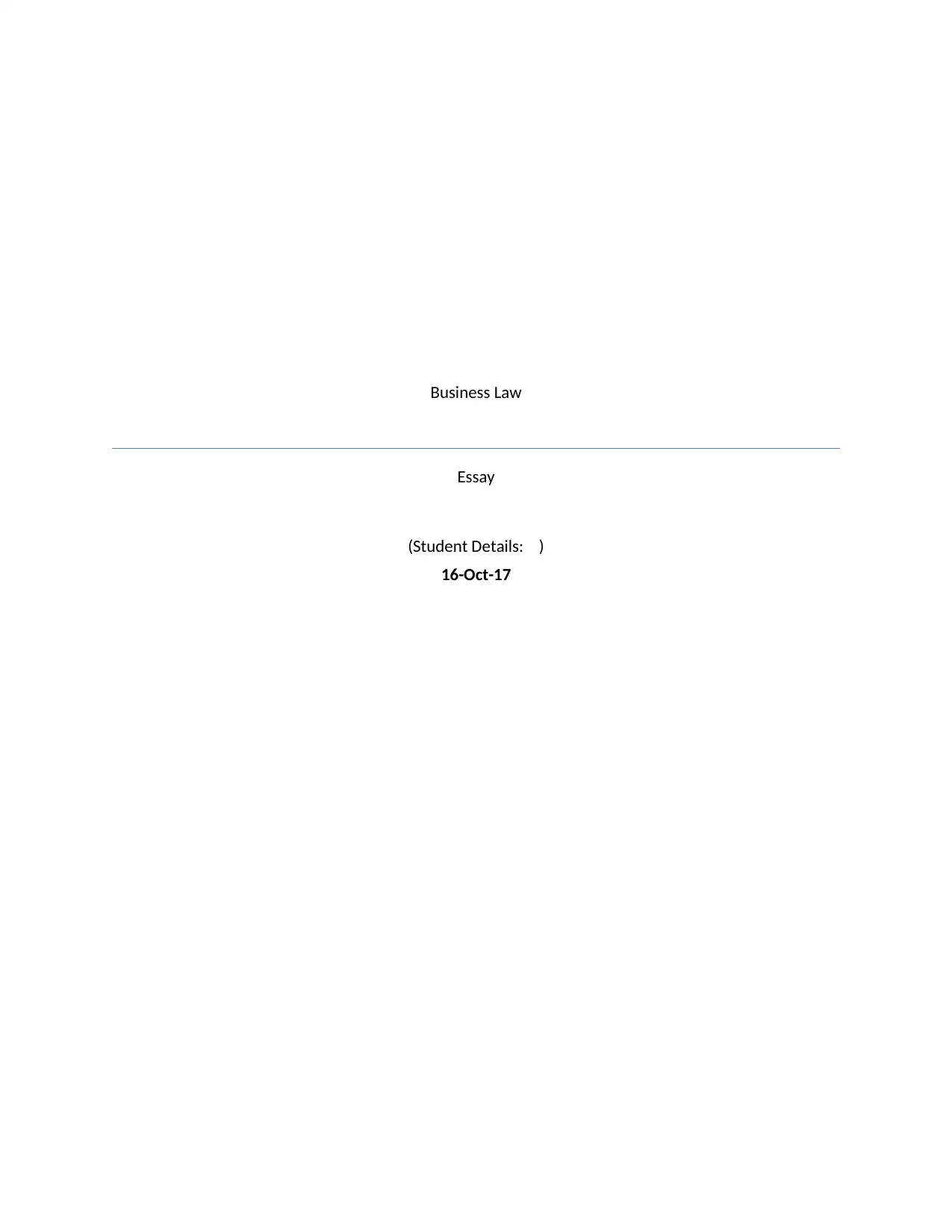
Business Law
Essay
(Student Details: )
16-Oct-17
Essay
(Student Details: )
16-Oct-17
Paraphrase This Document
Need a fresh take? Get an instant paraphrase of this document with our AI Paraphraser
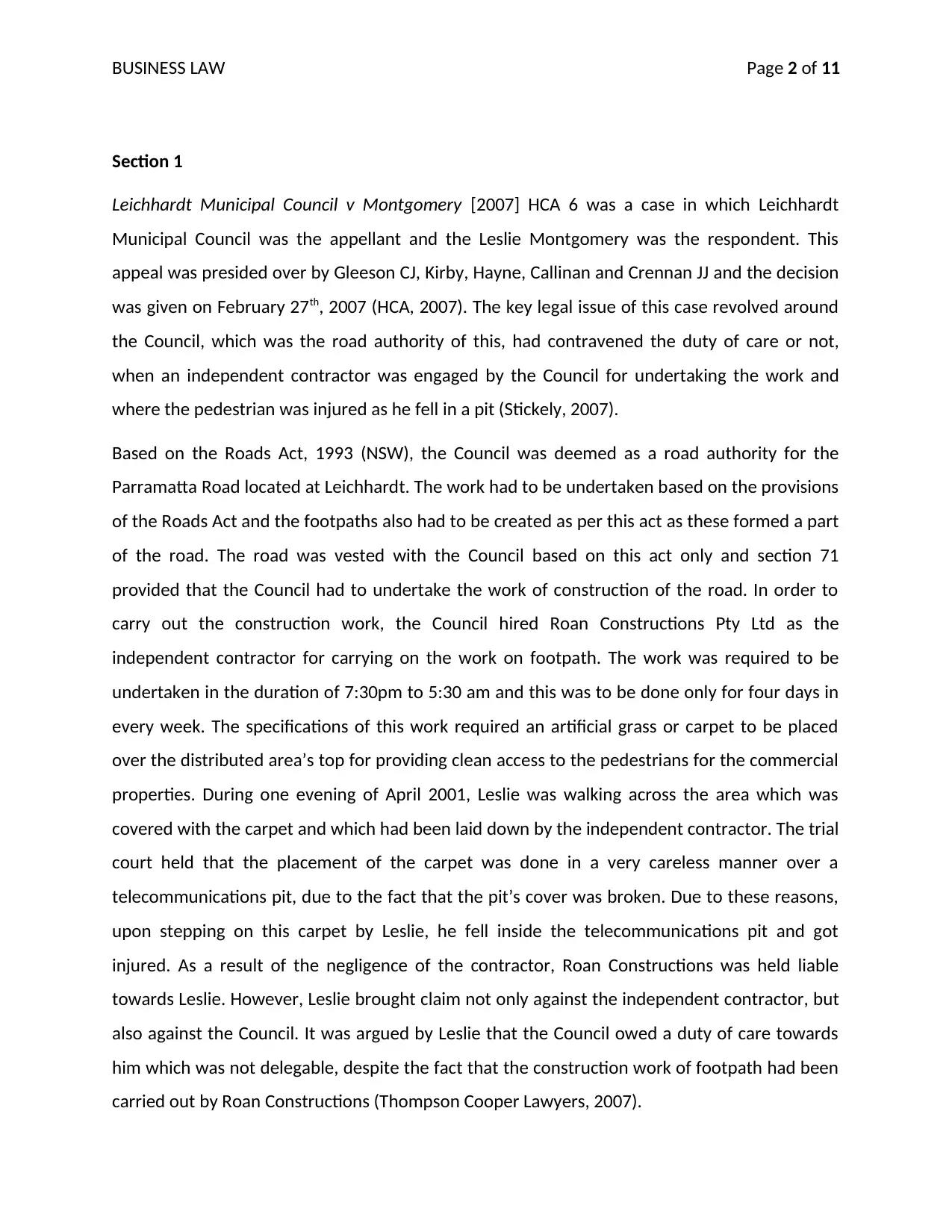
BUSINESS LAW Page 2 of 11
Section 1
Leichhardt Municipal Council v Montgomery [2007] HCA 6 was a case in which Leichhardt
Municipal Council was the appellant and the Leslie Montgomery was the respondent. This
appeal was presided over by Gleeson CJ, Kirby, Hayne, Callinan and Crennan JJ and the decision
was given on February 27th, 2007 (HCA, 2007). The key legal issue of this case revolved around
the Council, which was the road authority of this, had contravened the duty of care or not,
when an independent contractor was engaged by the Council for undertaking the work and
where the pedestrian was injured as he fell in a pit (Stickely, 2007).
Based on the Roads Act, 1993 (NSW), the Council was deemed as a road authority for the
Parramatta Road located at Leichhardt. The work had to be undertaken based on the provisions
of the Roads Act and the footpaths also had to be created as per this act as these formed a part
of the road. The road was vested with the Council based on this act only and section 71
provided that the Council had to undertake the work of construction of the road. In order to
carry out the construction work, the Council hired Roan Constructions Pty Ltd as the
independent contractor for carrying on the work on footpath. The work was required to be
undertaken in the duration of 7:30pm to 5:30 am and this was to be done only for four days in
every week. The specifications of this work required an artificial grass or carpet to be placed
over the distributed area’s top for providing clean access to the pedestrians for the commercial
properties. During one evening of April 2001, Leslie was walking across the area which was
covered with the carpet and which had been laid down by the independent contractor. The trial
court held that the placement of the carpet was done in a very careless manner over a
telecommunications pit, due to the fact that the pit’s cover was broken. Due to these reasons,
upon stepping on this carpet by Leslie, he fell inside the telecommunications pit and got
injured. As a result of the negligence of the contractor, Roan Constructions was held liable
towards Leslie. However, Leslie brought claim not only against the independent contractor, but
also against the Council. It was argued by Leslie that the Council owed a duty of care towards
him which was not delegable, despite the fact that the construction work of footpath had been
carried out by Roan Constructions (Thompson Cooper Lawyers, 2007).
Section 1
Leichhardt Municipal Council v Montgomery [2007] HCA 6 was a case in which Leichhardt
Municipal Council was the appellant and the Leslie Montgomery was the respondent. This
appeal was presided over by Gleeson CJ, Kirby, Hayne, Callinan and Crennan JJ and the decision
was given on February 27th, 2007 (HCA, 2007). The key legal issue of this case revolved around
the Council, which was the road authority of this, had contravened the duty of care or not,
when an independent contractor was engaged by the Council for undertaking the work and
where the pedestrian was injured as he fell in a pit (Stickely, 2007).
Based on the Roads Act, 1993 (NSW), the Council was deemed as a road authority for the
Parramatta Road located at Leichhardt. The work had to be undertaken based on the provisions
of the Roads Act and the footpaths also had to be created as per this act as these formed a part
of the road. The road was vested with the Council based on this act only and section 71
provided that the Council had to undertake the work of construction of the road. In order to
carry out the construction work, the Council hired Roan Constructions Pty Ltd as the
independent contractor for carrying on the work on footpath. The work was required to be
undertaken in the duration of 7:30pm to 5:30 am and this was to be done only for four days in
every week. The specifications of this work required an artificial grass or carpet to be placed
over the distributed area’s top for providing clean access to the pedestrians for the commercial
properties. During one evening of April 2001, Leslie was walking across the area which was
covered with the carpet and which had been laid down by the independent contractor. The trial
court held that the placement of the carpet was done in a very careless manner over a
telecommunications pit, due to the fact that the pit’s cover was broken. Due to these reasons,
upon stepping on this carpet by Leslie, he fell inside the telecommunications pit and got
injured. As a result of the negligence of the contractor, Roan Constructions was held liable
towards Leslie. However, Leslie brought claim not only against the independent contractor, but
also against the Council. It was argued by Leslie that the Council owed a duty of care towards
him which was not delegable, despite the fact that the construction work of footpath had been
carried out by Roan Constructions (Thompson Cooper Lawyers, 2007).
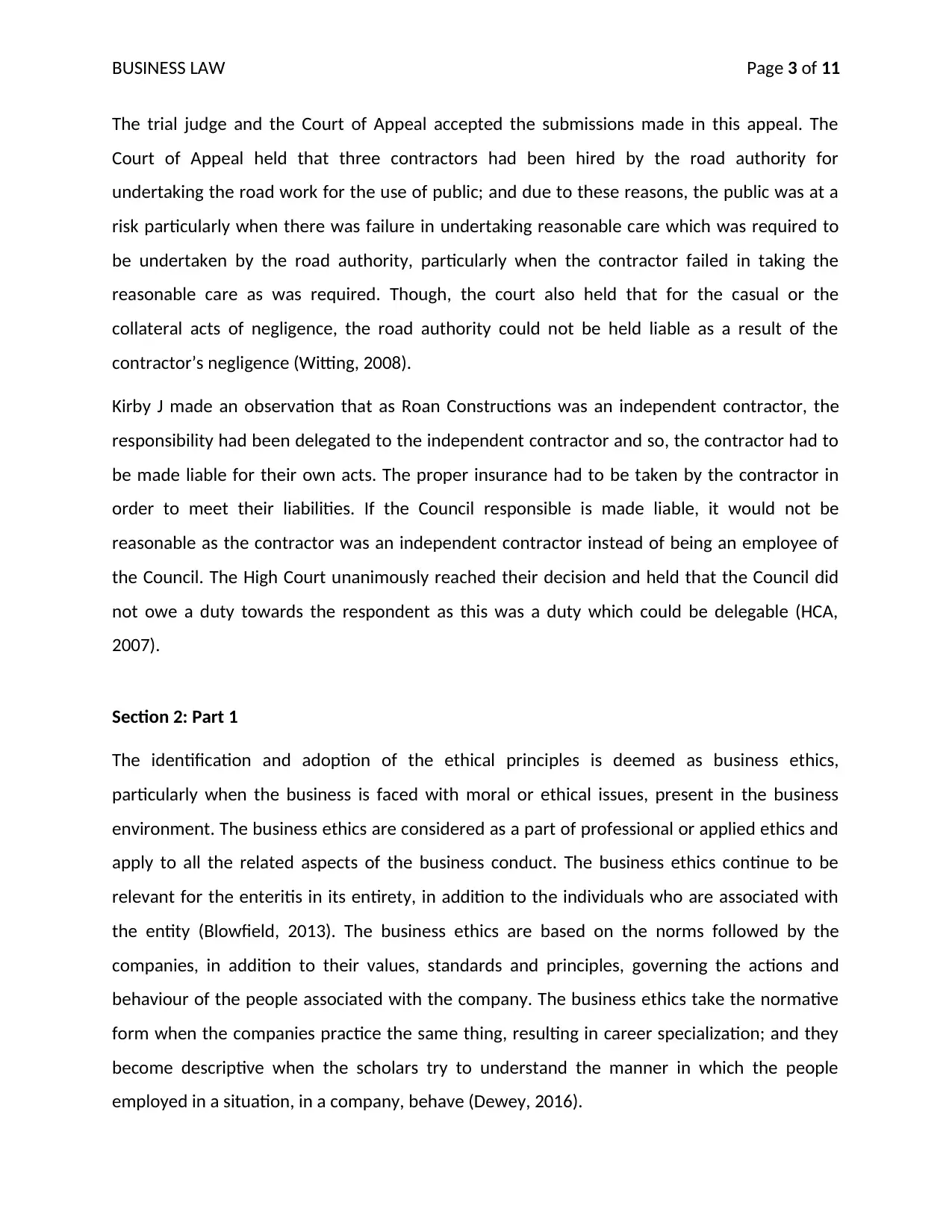
BUSINESS LAW Page 3 of 11
The trial judge and the Court of Appeal accepted the submissions made in this appeal. The
Court of Appeal held that three contractors had been hired by the road authority for
undertaking the road work for the use of public; and due to these reasons, the public was at a
risk particularly when there was failure in undertaking reasonable care which was required to
be undertaken by the road authority, particularly when the contractor failed in taking the
reasonable care as was required. Though, the court also held that for the casual or the
collateral acts of negligence, the road authority could not be held liable as a result of the
contractor’s negligence (Witting, 2008).
Kirby J made an observation that as Roan Constructions was an independent contractor, the
responsibility had been delegated to the independent contractor and so, the contractor had to
be made liable for their own acts. The proper insurance had to be taken by the contractor in
order to meet their liabilities. If the Council responsible is made liable, it would not be
reasonable as the contractor was an independent contractor instead of being an employee of
the Council. The High Court unanimously reached their decision and held that the Council did
not owe a duty towards the respondent as this was a duty which could be delegable (HCA,
2007).
Section 2: Part 1
The identification and adoption of the ethical principles is deemed as business ethics,
particularly when the business is faced with moral or ethical issues, present in the business
environment. The business ethics are considered as a part of professional or applied ethics and
apply to all the related aspects of the business conduct. The business ethics continue to be
relevant for the enteritis in its entirety, in addition to the individuals who are associated with
the entity (Blowfield, 2013). The business ethics are based on the norms followed by the
companies, in addition to their values, standards and principles, governing the actions and
behaviour of the people associated with the company. The business ethics take the normative
form when the companies practice the same thing, resulting in career specialization; and they
become descriptive when the scholars try to understand the manner in which the people
employed in a situation, in a company, behave (Dewey, 2016).
The trial judge and the Court of Appeal accepted the submissions made in this appeal. The
Court of Appeal held that three contractors had been hired by the road authority for
undertaking the road work for the use of public; and due to these reasons, the public was at a
risk particularly when there was failure in undertaking reasonable care which was required to
be undertaken by the road authority, particularly when the contractor failed in taking the
reasonable care as was required. Though, the court also held that for the casual or the
collateral acts of negligence, the road authority could not be held liable as a result of the
contractor’s negligence (Witting, 2008).
Kirby J made an observation that as Roan Constructions was an independent contractor, the
responsibility had been delegated to the independent contractor and so, the contractor had to
be made liable for their own acts. The proper insurance had to be taken by the contractor in
order to meet their liabilities. If the Council responsible is made liable, it would not be
reasonable as the contractor was an independent contractor instead of being an employee of
the Council. The High Court unanimously reached their decision and held that the Council did
not owe a duty towards the respondent as this was a duty which could be delegable (HCA,
2007).
Section 2: Part 1
The identification and adoption of the ethical principles is deemed as business ethics,
particularly when the business is faced with moral or ethical issues, present in the business
environment. The business ethics are considered as a part of professional or applied ethics and
apply to all the related aspects of the business conduct. The business ethics continue to be
relevant for the enteritis in its entirety, in addition to the individuals who are associated with
the entity (Blowfield, 2013). The business ethics are based on the norms followed by the
companies, in addition to their values, standards and principles, governing the actions and
behaviour of the people associated with the company. The business ethics take the normative
form when the companies practice the same thing, resulting in career specialization; and they
become descriptive when the scholars try to understand the manner in which the people
employed in a situation, in a company, behave (Dewey, 2016).
⊘ This is a preview!⊘
Do you want full access?
Subscribe today to unlock all pages.

Trusted by 1+ million students worldwide
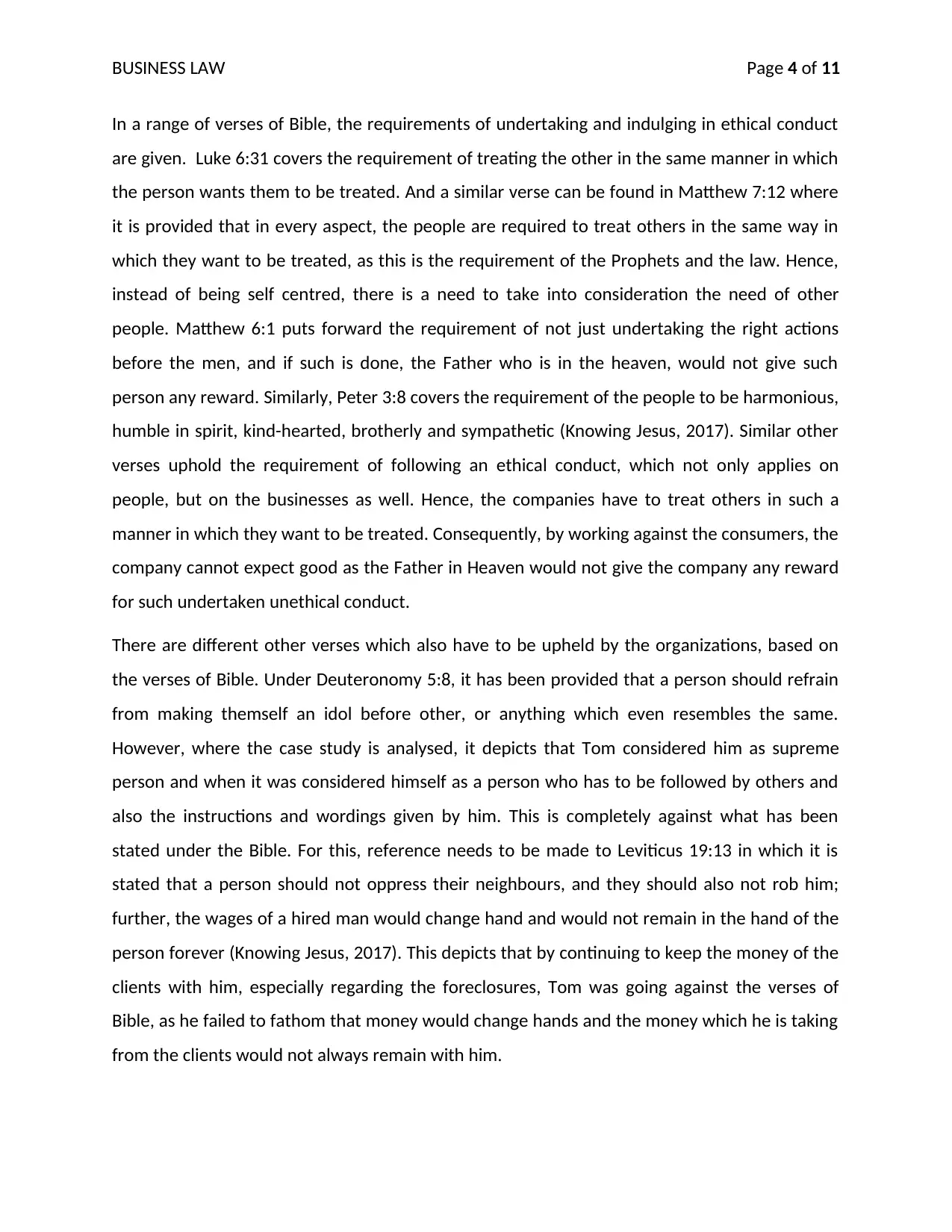
BUSINESS LAW Page 4 of 11
In a range of verses of Bible, the requirements of undertaking and indulging in ethical conduct
are given. Luke 6:31 covers the requirement of treating the other in the same manner in which
the person wants them to be treated. And a similar verse can be found in Matthew 7:12 where
it is provided that in every aspect, the people are required to treat others in the same way in
which they want to be treated, as this is the requirement of the Prophets and the law. Hence,
instead of being self centred, there is a need to take into consideration the need of other
people. Matthew 6:1 puts forward the requirement of not just undertaking the right actions
before the men, and if such is done, the Father who is in the heaven, would not give such
person any reward. Similarly, Peter 3:8 covers the requirement of the people to be harmonious,
humble in spirit, kind-hearted, brotherly and sympathetic (Knowing Jesus, 2017). Similar other
verses uphold the requirement of following an ethical conduct, which not only applies on
people, but on the businesses as well. Hence, the companies have to treat others in such a
manner in which they want to be treated. Consequently, by working against the consumers, the
company cannot expect good as the Father in Heaven would not give the company any reward
for such undertaken unethical conduct.
There are different other verses which also have to be upheld by the organizations, based on
the verses of Bible. Under Deuteronomy 5:8, it has been provided that a person should refrain
from making themself an idol before other, or anything which even resembles the same.
However, where the case study is analysed, it depicts that Tom considered him as supreme
person and when it was considered himself as a person who has to be followed by others and
also the instructions and wordings given by him. This is completely against what has been
stated under the Bible. For this, reference needs to be made to Leviticus 19:13 in which it is
stated that a person should not oppress their neighbours, and they should also not rob him;
further, the wages of a hired man would change hand and would not remain in the hand of the
person forever (Knowing Jesus, 2017). This depicts that by continuing to keep the money of the
clients with him, especially regarding the foreclosures, Tom was going against the verses of
Bible, as he failed to fathom that money would change hands and the money which he is taking
from the clients would not always remain with him.
In a range of verses of Bible, the requirements of undertaking and indulging in ethical conduct
are given. Luke 6:31 covers the requirement of treating the other in the same manner in which
the person wants them to be treated. And a similar verse can be found in Matthew 7:12 where
it is provided that in every aspect, the people are required to treat others in the same way in
which they want to be treated, as this is the requirement of the Prophets and the law. Hence,
instead of being self centred, there is a need to take into consideration the need of other
people. Matthew 6:1 puts forward the requirement of not just undertaking the right actions
before the men, and if such is done, the Father who is in the heaven, would not give such
person any reward. Similarly, Peter 3:8 covers the requirement of the people to be harmonious,
humble in spirit, kind-hearted, brotherly and sympathetic (Knowing Jesus, 2017). Similar other
verses uphold the requirement of following an ethical conduct, which not only applies on
people, but on the businesses as well. Hence, the companies have to treat others in such a
manner in which they want to be treated. Consequently, by working against the consumers, the
company cannot expect good as the Father in Heaven would not give the company any reward
for such undertaken unethical conduct.
There are different other verses which also have to be upheld by the organizations, based on
the verses of Bible. Under Deuteronomy 5:8, it has been provided that a person should refrain
from making themself an idol before other, or anything which even resembles the same.
However, where the case study is analysed, it depicts that Tom considered him as supreme
person and when it was considered himself as a person who has to be followed by others and
also the instructions and wordings given by him. This is completely against what has been
stated under the Bible. For this, reference needs to be made to Leviticus 19:13 in which it is
stated that a person should not oppress their neighbours, and they should also not rob him;
further, the wages of a hired man would change hand and would not remain in the hand of the
person forever (Knowing Jesus, 2017). This depicts that by continuing to keep the money of the
clients with him, especially regarding the foreclosures, Tom was going against the verses of
Bible, as he failed to fathom that money would change hands and the money which he is taking
from the clients would not always remain with him.
Paraphrase This Document
Need a fresh take? Get an instant paraphrase of this document with our AI Paraphraser
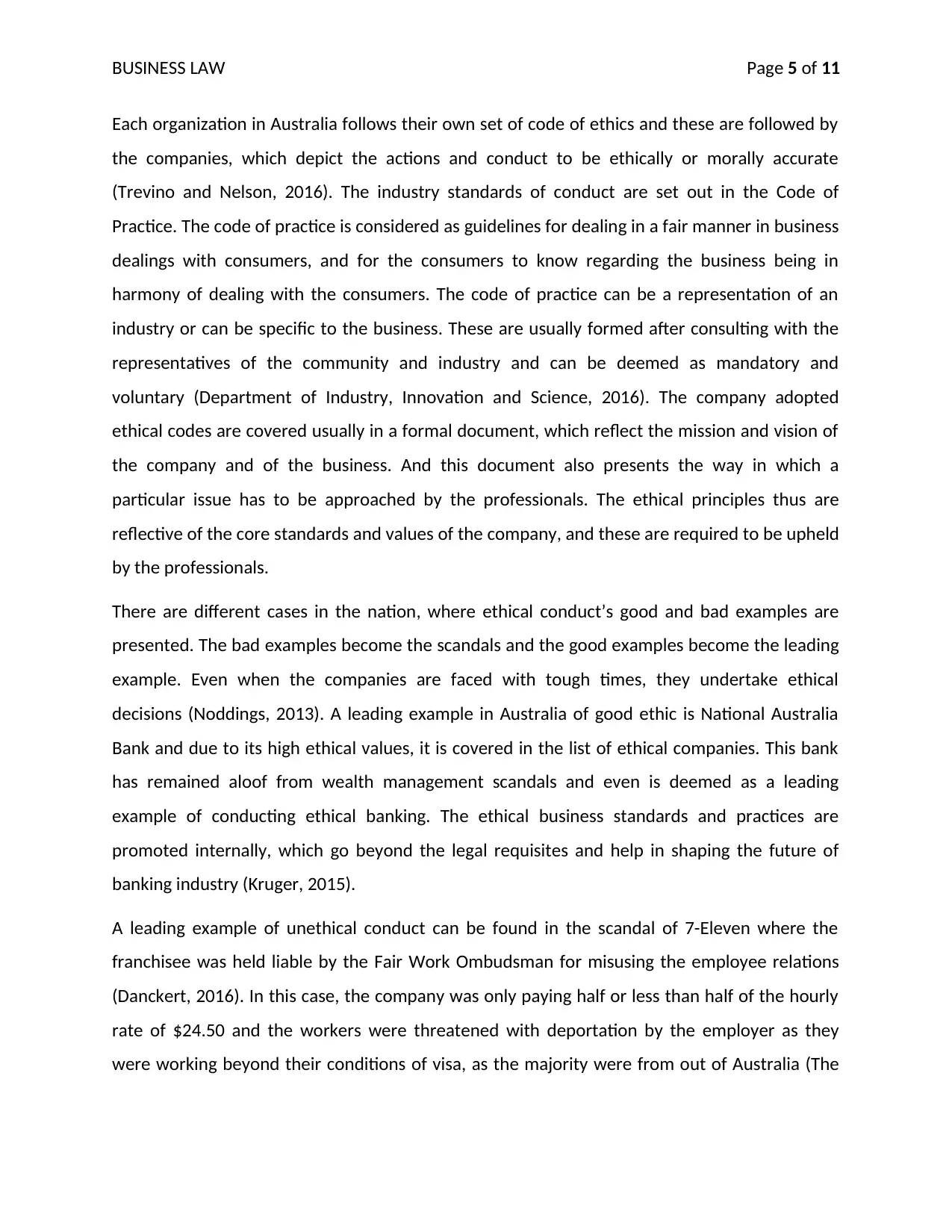
BUSINESS LAW Page 5 of 11
Each organization in Australia follows their own set of code of ethics and these are followed by
the companies, which depict the actions and conduct to be ethically or morally accurate
(Trevino and Nelson, 2016). The industry standards of conduct are set out in the Code of
Practice. The code of practice is considered as guidelines for dealing in a fair manner in business
dealings with consumers, and for the consumers to know regarding the business being in
harmony of dealing with the consumers. The code of practice can be a representation of an
industry or can be specific to the business. These are usually formed after consulting with the
representatives of the community and industry and can be deemed as mandatory and
voluntary (Department of Industry, Innovation and Science, 2016). The company adopted
ethical codes are covered usually in a formal document, which reflect the mission and vision of
the company and of the business. And this document also presents the way in which a
particular issue has to be approached by the professionals. The ethical principles thus are
reflective of the core standards and values of the company, and these are required to be upheld
by the professionals.
There are different cases in the nation, where ethical conduct’s good and bad examples are
presented. The bad examples become the scandals and the good examples become the leading
example. Even when the companies are faced with tough times, they undertake ethical
decisions (Noddings, 2013). A leading example in Australia of good ethic is National Australia
Bank and due to its high ethical values, it is covered in the list of ethical companies. This bank
has remained aloof from wealth management scandals and even is deemed as a leading
example of conducting ethical banking. The ethical business standards and practices are
promoted internally, which go beyond the legal requisites and help in shaping the future of
banking industry (Kruger, 2015).
A leading example of unethical conduct can be found in the scandal of 7-Eleven where the
franchisee was held liable by the Fair Work Ombudsman for misusing the employee relations
(Danckert, 2016). In this case, the company was only paying half or less than half of the hourly
rate of $24.50 and the workers were threatened with deportation by the employer as they
were working beyond their conditions of visa, as the majority were from out of Australia (The
Each organization in Australia follows their own set of code of ethics and these are followed by
the companies, which depict the actions and conduct to be ethically or morally accurate
(Trevino and Nelson, 2016). The industry standards of conduct are set out in the Code of
Practice. The code of practice is considered as guidelines for dealing in a fair manner in business
dealings with consumers, and for the consumers to know regarding the business being in
harmony of dealing with the consumers. The code of practice can be a representation of an
industry or can be specific to the business. These are usually formed after consulting with the
representatives of the community and industry and can be deemed as mandatory and
voluntary (Department of Industry, Innovation and Science, 2016). The company adopted
ethical codes are covered usually in a formal document, which reflect the mission and vision of
the company and of the business. And this document also presents the way in which a
particular issue has to be approached by the professionals. The ethical principles thus are
reflective of the core standards and values of the company, and these are required to be upheld
by the professionals.
There are different cases in the nation, where ethical conduct’s good and bad examples are
presented. The bad examples become the scandals and the good examples become the leading
example. Even when the companies are faced with tough times, they undertake ethical
decisions (Noddings, 2013). A leading example in Australia of good ethic is National Australia
Bank and due to its high ethical values, it is covered in the list of ethical companies. This bank
has remained aloof from wealth management scandals and even is deemed as a leading
example of conducting ethical banking. The ethical business standards and practices are
promoted internally, which go beyond the legal requisites and help in shaping the future of
banking industry (Kruger, 2015).
A leading example of unethical conduct can be found in the scandal of 7-Eleven where the
franchisee was held liable by the Fair Work Ombudsman for misusing the employee relations
(Danckert, 2016). In this case, the company was only paying half or less than half of the hourly
rate of $24.50 and the workers were threatened with deportation by the employer as they
were working beyond their conditions of visa, as the majority were from out of Australia (The
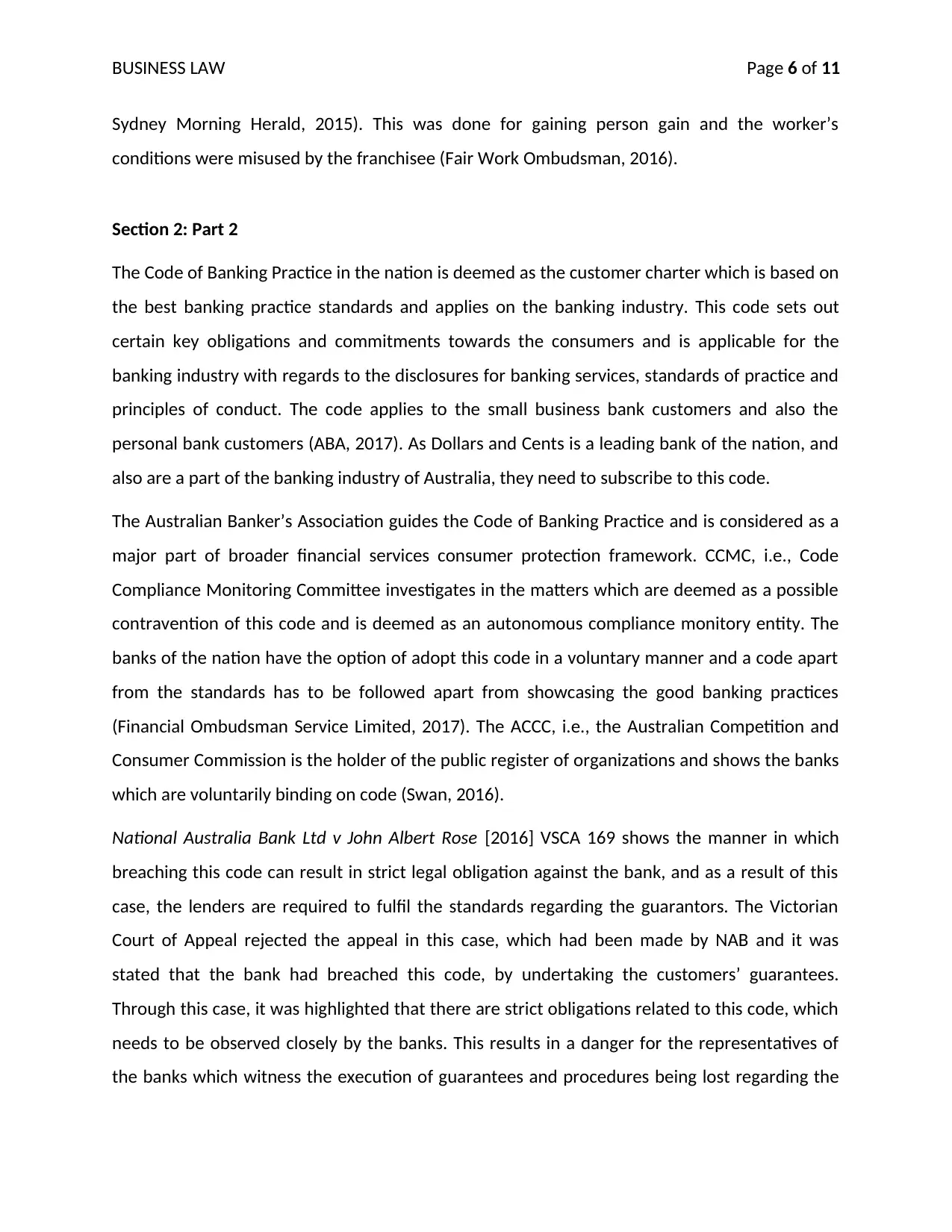
BUSINESS LAW Page 6 of 11
Sydney Morning Herald, 2015). This was done for gaining person gain and the worker’s
conditions were misused by the franchisee (Fair Work Ombudsman, 2016).
Section 2: Part 2
The Code of Banking Practice in the nation is deemed as the customer charter which is based on
the best banking practice standards and applies on the banking industry. This code sets out
certain key obligations and commitments towards the consumers and is applicable for the
banking industry with regards to the disclosures for banking services, standards of practice and
principles of conduct. The code applies to the small business bank customers and also the
personal bank customers (ABA, 2017). As Dollars and Cents is a leading bank of the nation, and
also are a part of the banking industry of Australia, they need to subscribe to this code.
The Australian Banker’s Association guides the Code of Banking Practice and is considered as a
major part of broader financial services consumer protection framework. CCMC, i.e., Code
Compliance Monitoring Committee investigates in the matters which are deemed as a possible
contravention of this code and is deemed as an autonomous compliance monitory entity. The
banks of the nation have the option of adopt this code in a voluntary manner and a code apart
from the standards has to be followed apart from showcasing the good banking practices
(Financial Ombudsman Service Limited, 2017). The ACCC, i.e., the Australian Competition and
Consumer Commission is the holder of the public register of organizations and shows the banks
which are voluntarily binding on code (Swan, 2016).
National Australia Bank Ltd v John Albert Rose [2016] VSCA 169 shows the manner in which
breaching this code can result in strict legal obligation against the bank, and as a result of this
case, the lenders are required to fulfil the standards regarding the guarantors. The Victorian
Court of Appeal rejected the appeal in this case, which had been made by NAB and it was
stated that the bank had breached this code, by undertaking the customers’ guarantees.
Through this case, it was highlighted that there are strict obligations related to this code, which
needs to be observed closely by the banks. This results in a danger for the representatives of
the banks which witness the execution of guarantees and procedures being lost regarding the
Sydney Morning Herald, 2015). This was done for gaining person gain and the worker’s
conditions were misused by the franchisee (Fair Work Ombudsman, 2016).
Section 2: Part 2
The Code of Banking Practice in the nation is deemed as the customer charter which is based on
the best banking practice standards and applies on the banking industry. This code sets out
certain key obligations and commitments towards the consumers and is applicable for the
banking industry with regards to the disclosures for banking services, standards of practice and
principles of conduct. The code applies to the small business bank customers and also the
personal bank customers (ABA, 2017). As Dollars and Cents is a leading bank of the nation, and
also are a part of the banking industry of Australia, they need to subscribe to this code.
The Australian Banker’s Association guides the Code of Banking Practice and is considered as a
major part of broader financial services consumer protection framework. CCMC, i.e., Code
Compliance Monitoring Committee investigates in the matters which are deemed as a possible
contravention of this code and is deemed as an autonomous compliance monitory entity. The
banks of the nation have the option of adopt this code in a voluntary manner and a code apart
from the standards has to be followed apart from showcasing the good banking practices
(Financial Ombudsman Service Limited, 2017). The ACCC, i.e., the Australian Competition and
Consumer Commission is the holder of the public register of organizations and shows the banks
which are voluntarily binding on code (Swan, 2016).
National Australia Bank Ltd v John Albert Rose [2016] VSCA 169 shows the manner in which
breaching this code can result in strict legal obligation against the bank, and as a result of this
case, the lenders are required to fulfil the standards regarding the guarantors. The Victorian
Court of Appeal rejected the appeal in this case, which had been made by NAB and it was
stated that the bank had breached this code, by undertaking the customers’ guarantees.
Through this case, it was highlighted that there are strict obligations related to this code, which
needs to be observed closely by the banks. This results in a danger for the representatives of
the banks which witness the execution of guarantees and procedures being lost regarding the
⊘ This is a preview!⊘
Do you want full access?
Subscribe today to unlock all pages.

Trusted by 1+ million students worldwide
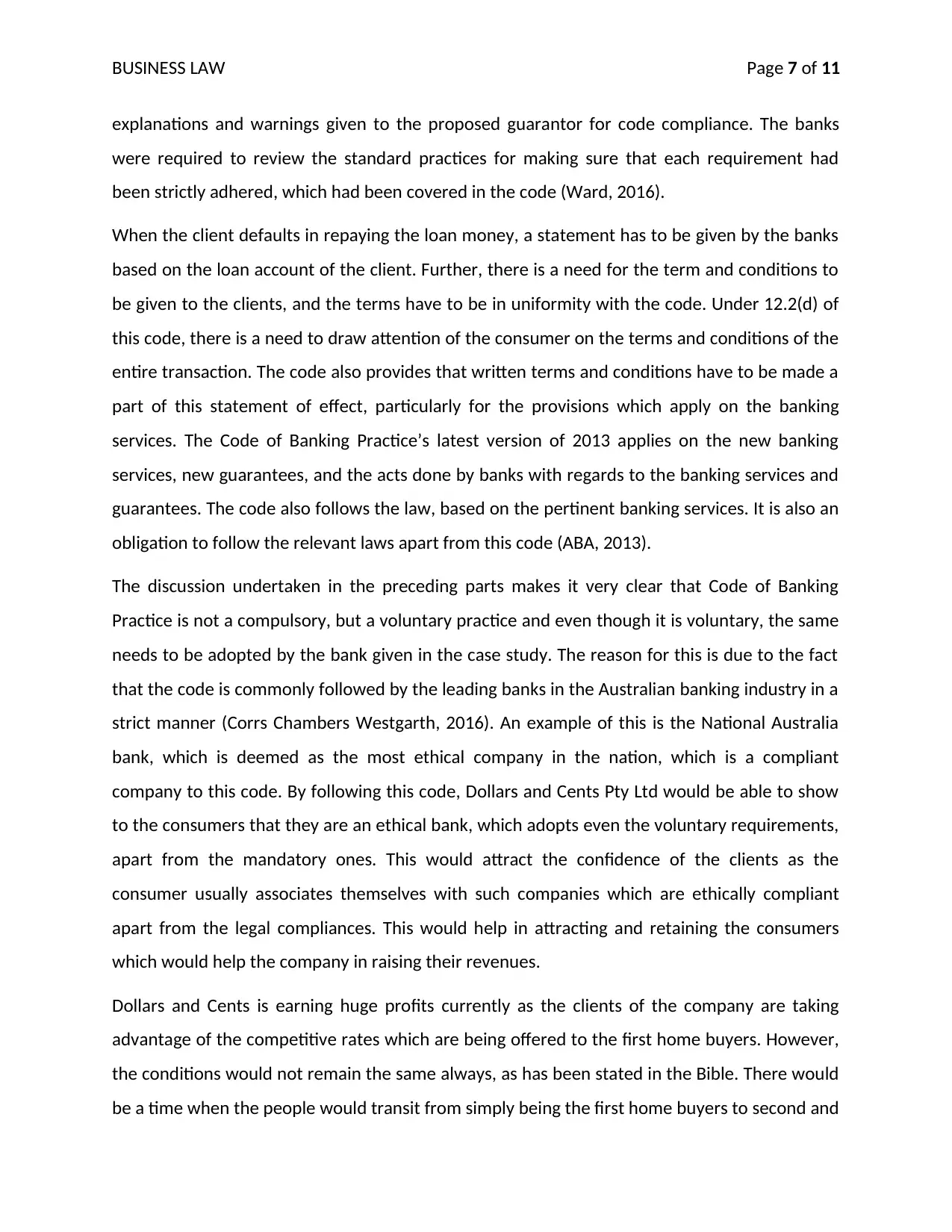
BUSINESS LAW Page 7 of 11
explanations and warnings given to the proposed guarantor for code compliance. The banks
were required to review the standard practices for making sure that each requirement had
been strictly adhered, which had been covered in the code (Ward, 2016).
When the client defaults in repaying the loan money, a statement has to be given by the banks
based on the loan account of the client. Further, there is a need for the term and conditions to
be given to the clients, and the terms have to be in uniformity with the code. Under 12.2(d) of
this code, there is a need to draw attention of the consumer on the terms and conditions of the
entire transaction. The code also provides that written terms and conditions have to be made a
part of this statement of effect, particularly for the provisions which apply on the banking
services. The Code of Banking Practice’s latest version of 2013 applies on the new banking
services, new guarantees, and the acts done by banks with regards to the banking services and
guarantees. The code also follows the law, based on the pertinent banking services. It is also an
obligation to follow the relevant laws apart from this code (ABA, 2013).
The discussion undertaken in the preceding parts makes it very clear that Code of Banking
Practice is not a compulsory, but a voluntary practice and even though it is voluntary, the same
needs to be adopted by the bank given in the case study. The reason for this is due to the fact
that the code is commonly followed by the leading banks in the Australian banking industry in a
strict manner (Corrs Chambers Westgarth, 2016). An example of this is the National Australia
bank, which is deemed as the most ethical company in the nation, which is a compliant
company to this code. By following this code, Dollars and Cents Pty Ltd would be able to show
to the consumers that they are an ethical bank, which adopts even the voluntary requirements,
apart from the mandatory ones. This would attract the confidence of the clients as the
consumer usually associates themselves with such companies which are ethically compliant
apart from the legal compliances. This would help in attracting and retaining the consumers
which would help the company in raising their revenues.
Dollars and Cents is earning huge profits currently as the clients of the company are taking
advantage of the competitive rates which are being offered to the first home buyers. However,
the conditions would not remain the same always, as has been stated in the Bible. There would
be a time when the people would transit from simply being the first home buyers to second and
explanations and warnings given to the proposed guarantor for code compliance. The banks
were required to review the standard practices for making sure that each requirement had
been strictly adhered, which had been covered in the code (Ward, 2016).
When the client defaults in repaying the loan money, a statement has to be given by the banks
based on the loan account of the client. Further, there is a need for the term and conditions to
be given to the clients, and the terms have to be in uniformity with the code. Under 12.2(d) of
this code, there is a need to draw attention of the consumer on the terms and conditions of the
entire transaction. The code also provides that written terms and conditions have to be made a
part of this statement of effect, particularly for the provisions which apply on the banking
services. The Code of Banking Practice’s latest version of 2013 applies on the new banking
services, new guarantees, and the acts done by banks with regards to the banking services and
guarantees. The code also follows the law, based on the pertinent banking services. It is also an
obligation to follow the relevant laws apart from this code (ABA, 2013).
The discussion undertaken in the preceding parts makes it very clear that Code of Banking
Practice is not a compulsory, but a voluntary practice and even though it is voluntary, the same
needs to be adopted by the bank given in the case study. The reason for this is due to the fact
that the code is commonly followed by the leading banks in the Australian banking industry in a
strict manner (Corrs Chambers Westgarth, 2016). An example of this is the National Australia
bank, which is deemed as the most ethical company in the nation, which is a compliant
company to this code. By following this code, Dollars and Cents Pty Ltd would be able to show
to the consumers that they are an ethical bank, which adopts even the voluntary requirements,
apart from the mandatory ones. This would attract the confidence of the clients as the
consumer usually associates themselves with such companies which are ethically compliant
apart from the legal compliances. This would help in attracting and retaining the consumers
which would help the company in raising their revenues.
Dollars and Cents is earning huge profits currently as the clients of the company are taking
advantage of the competitive rates which are being offered to the first home buyers. However,
the conditions would not remain the same always, as has been stated in the Bible. There would
be a time when the people would transit from simply being the first home buyers to second and
Paraphrase This Document
Need a fresh take? Get an instant paraphrase of this document with our AI Paraphraser
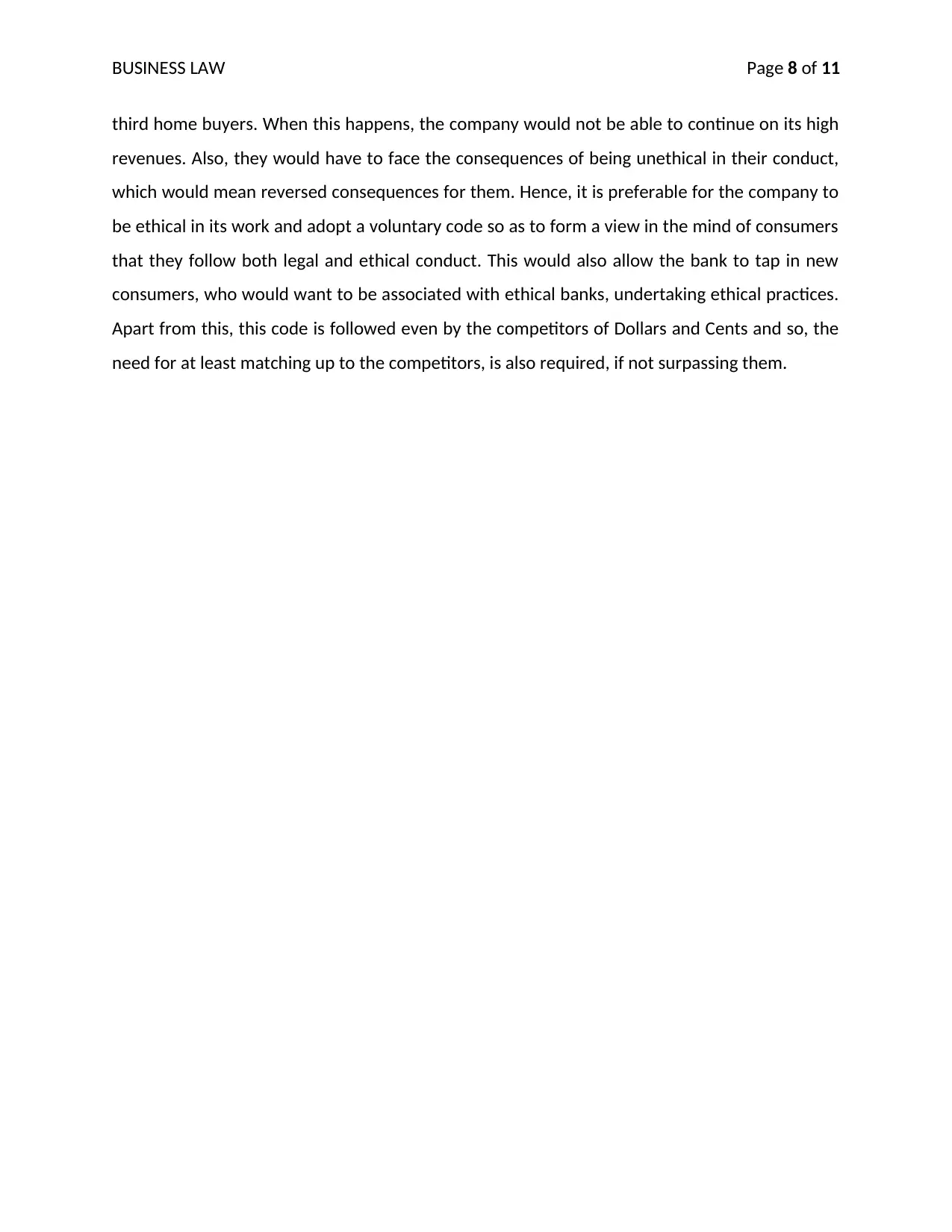
BUSINESS LAW Page 8 of 11
third home buyers. When this happens, the company would not be able to continue on its high
revenues. Also, they would have to face the consequences of being unethical in their conduct,
which would mean reversed consequences for them. Hence, it is preferable for the company to
be ethical in its work and adopt a voluntary code so as to form a view in the mind of consumers
that they follow both legal and ethical conduct. This would also allow the bank to tap in new
consumers, who would want to be associated with ethical banks, undertaking ethical practices.
Apart from this, this code is followed even by the competitors of Dollars and Cents and so, the
need for at least matching up to the competitors, is also required, if not surpassing them.
third home buyers. When this happens, the company would not be able to continue on its high
revenues. Also, they would have to face the consequences of being unethical in their conduct,
which would mean reversed consequences for them. Hence, it is preferable for the company to
be ethical in its work and adopt a voluntary code so as to form a view in the mind of consumers
that they follow both legal and ethical conduct. This would also allow the bank to tap in new
consumers, who would want to be associated with ethical banks, undertaking ethical practices.
Apart from this, this code is followed even by the competitors of Dollars and Cents and so, the
need for at least matching up to the competitors, is also required, if not surpassing them.
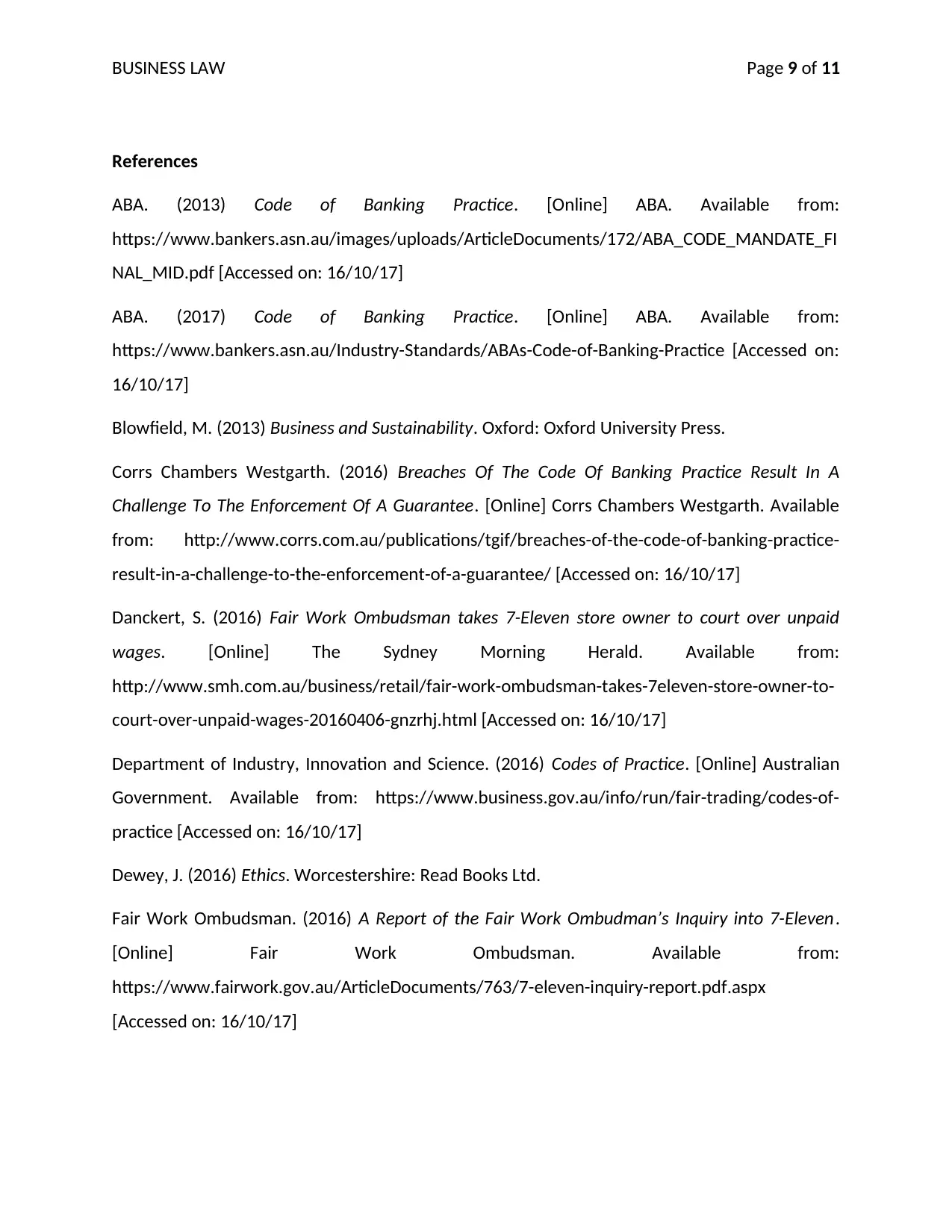
BUSINESS LAW Page 9 of 11
References
ABA. (2013) Code of Banking Practice. [Online] ABA. Available from:
https://www.bankers.asn.au/images/uploads/ArticleDocuments/172/ABA_CODE_MANDATE_FI
NAL_MID.pdf [Accessed on: 16/10/17]
ABA. (2017) Code of Banking Practice. [Online] ABA. Available from:
https://www.bankers.asn.au/Industry-Standards/ABAs-Code-of-Banking-Practice [Accessed on:
16/10/17]
Blowfield, M. (2013) Business and Sustainability. Oxford: Oxford University Press.
Corrs Chambers Westgarth. (2016) Breaches Of The Code Of Banking Practice Result In A
Challenge To The Enforcement Of A Guarantee. [Online] Corrs Chambers Westgarth. Available
from: http://www.corrs.com.au/publications/tgif/breaches-of-the-code-of-banking-practice-
result-in-a-challenge-to-the-enforcement-of-a-guarantee/ [Accessed on: 16/10/17]
Danckert, S. (2016) Fair Work Ombudsman takes 7-Eleven store owner to court over unpaid
wages. [Online] The Sydney Morning Herald. Available from:
http://www.smh.com.au/business/retail/fair-work-ombudsman-takes-7eleven-store-owner-to-
court-over-unpaid-wages-20160406-gnzrhj.html [Accessed on: 16/10/17]
Department of Industry, Innovation and Science. (2016) Codes of Practice. [Online] Australian
Government. Available from: https://www.business.gov.au/info/run/fair-trading/codes-of-
practice [Accessed on: 16/10/17]
Dewey, J. (2016) Ethics. Worcestershire: Read Books Ltd.
Fair Work Ombudsman. (2016) A Report of the Fair Work Ombudman’s Inquiry into 7-Eleven.
[Online] Fair Work Ombudsman. Available from:
https://www.fairwork.gov.au/ArticleDocuments/763/7-eleven-inquiry-report.pdf.aspx
[Accessed on: 16/10/17]
References
ABA. (2013) Code of Banking Practice. [Online] ABA. Available from:
https://www.bankers.asn.au/images/uploads/ArticleDocuments/172/ABA_CODE_MANDATE_FI
NAL_MID.pdf [Accessed on: 16/10/17]
ABA. (2017) Code of Banking Practice. [Online] ABA. Available from:
https://www.bankers.asn.au/Industry-Standards/ABAs-Code-of-Banking-Practice [Accessed on:
16/10/17]
Blowfield, M. (2013) Business and Sustainability. Oxford: Oxford University Press.
Corrs Chambers Westgarth. (2016) Breaches Of The Code Of Banking Practice Result In A
Challenge To The Enforcement Of A Guarantee. [Online] Corrs Chambers Westgarth. Available
from: http://www.corrs.com.au/publications/tgif/breaches-of-the-code-of-banking-practice-
result-in-a-challenge-to-the-enforcement-of-a-guarantee/ [Accessed on: 16/10/17]
Danckert, S. (2016) Fair Work Ombudsman takes 7-Eleven store owner to court over unpaid
wages. [Online] The Sydney Morning Herald. Available from:
http://www.smh.com.au/business/retail/fair-work-ombudsman-takes-7eleven-store-owner-to-
court-over-unpaid-wages-20160406-gnzrhj.html [Accessed on: 16/10/17]
Department of Industry, Innovation and Science. (2016) Codes of Practice. [Online] Australian
Government. Available from: https://www.business.gov.au/info/run/fair-trading/codes-of-
practice [Accessed on: 16/10/17]
Dewey, J. (2016) Ethics. Worcestershire: Read Books Ltd.
Fair Work Ombudsman. (2016) A Report of the Fair Work Ombudman’s Inquiry into 7-Eleven.
[Online] Fair Work Ombudsman. Available from:
https://www.fairwork.gov.au/ArticleDocuments/763/7-eleven-inquiry-report.pdf.aspx
[Accessed on: 16/10/17]
⊘ This is a preview!⊘
Do you want full access?
Subscribe today to unlock all pages.

Trusted by 1+ million students worldwide
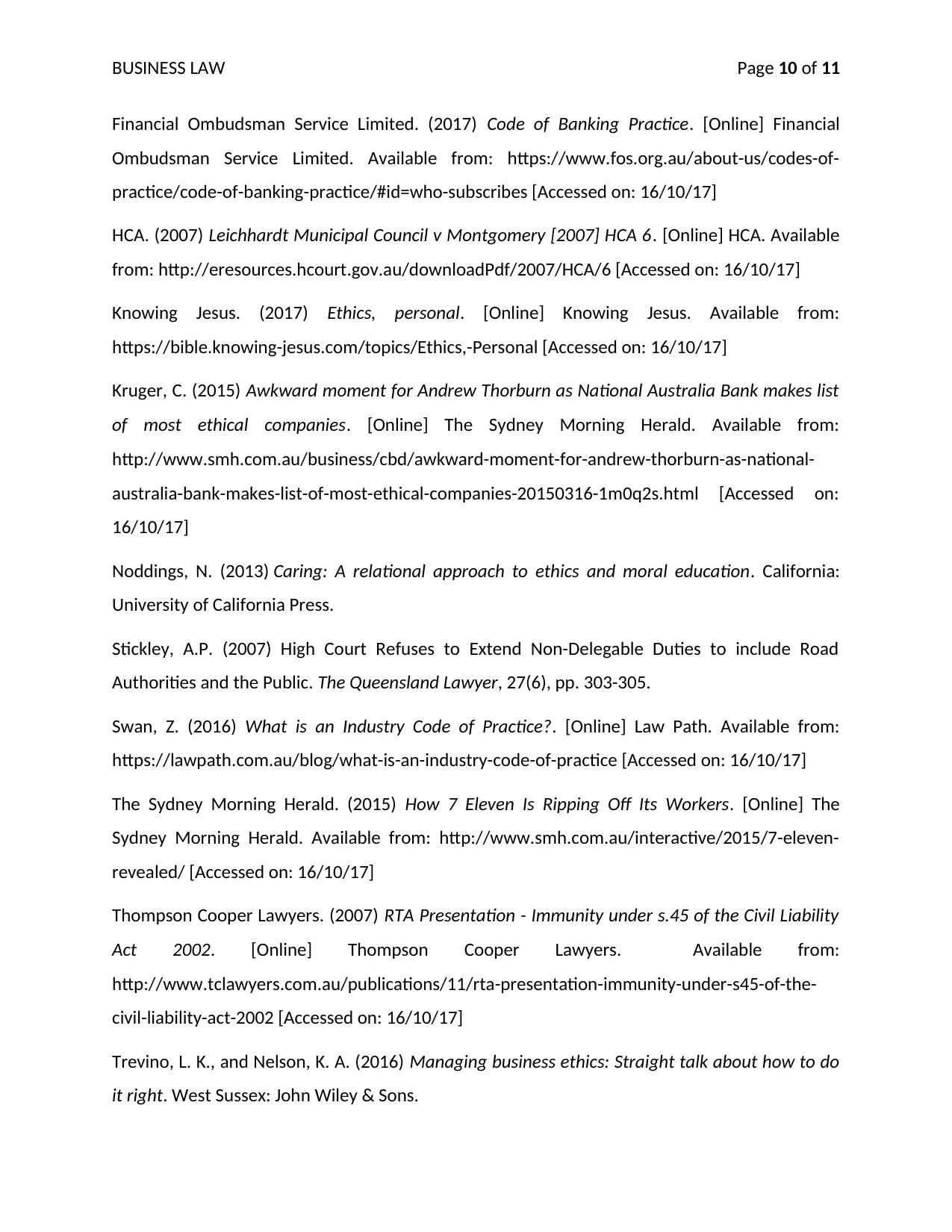
BUSINESS LAW Page 10 of 11
Financial Ombudsman Service Limited. (2017) Code of Banking Practice. [Online] Financial
Ombudsman Service Limited. Available from: https://www.fos.org.au/about-us/codes-of-
practice/code-of-banking-practice/#id=who-subscribes [Accessed on: 16/10/17]
HCA. (2007) Leichhardt Municipal Council v Montgomery [2007] HCA 6. [Online] HCA. Available
from: http://eresources.hcourt.gov.au/downloadPdf/2007/HCA/6 [Accessed on: 16/10/17]
Knowing Jesus. (2017) Ethics, personal. [Online] Knowing Jesus. Available from:
https://bible.knowing-jesus.com/topics/Ethics,-Personal [Accessed on: 16/10/17]
Kruger, C. (2015) Awkward moment for Andrew Thorburn as National Australia Bank makes list
of most ethical companies. [Online] The Sydney Morning Herald. Available from:
http://www.smh.com.au/business/cbd/awkward-moment-for-andrew-thorburn-as-national-
australia-bank-makes-list-of-most-ethical-companies-20150316-1m0q2s.html [Accessed on:
16/10/17]
Noddings, N. (2013) Caring: A relational approach to ethics and moral education. California:
University of California Press.
Stickley, A.P. (2007) High Court Refuses to Extend Non-Delegable Duties to include Road
Authorities and the Public. The Queensland Lawyer, 27(6), pp. 303-305.
Swan, Z. (2016) What is an Industry Code of Practice?. [Online] Law Path. Available from:
https://lawpath.com.au/blog/what-is-an-industry-code-of-practice [Accessed on: 16/10/17]
The Sydney Morning Herald. (2015) How 7 Eleven Is Ripping Off Its Workers. [Online] The
Sydney Morning Herald. Available from: http://www.smh.com.au/interactive/2015/7-eleven-
revealed/ [Accessed on: 16/10/17]
Thompson Cooper Lawyers. (2007) RTA Presentation - Immunity under s.45 of the Civil Liability
Act 2002. [Online] Thompson Cooper Lawyers. Available from:
http://www.tclawyers.com.au/publications/11/rta-presentation-immunity-under-s45-of-the-
civil-liability-act-2002 [Accessed on: 16/10/17]
Trevino, L. K., and Nelson, K. A. (2016) Managing business ethics: Straight talk about how to do
it right. West Sussex: John Wiley & Sons.
Financial Ombudsman Service Limited. (2017) Code of Banking Practice. [Online] Financial
Ombudsman Service Limited. Available from: https://www.fos.org.au/about-us/codes-of-
practice/code-of-banking-practice/#id=who-subscribes [Accessed on: 16/10/17]
HCA. (2007) Leichhardt Municipal Council v Montgomery [2007] HCA 6. [Online] HCA. Available
from: http://eresources.hcourt.gov.au/downloadPdf/2007/HCA/6 [Accessed on: 16/10/17]
Knowing Jesus. (2017) Ethics, personal. [Online] Knowing Jesus. Available from:
https://bible.knowing-jesus.com/topics/Ethics,-Personal [Accessed on: 16/10/17]
Kruger, C. (2015) Awkward moment for Andrew Thorburn as National Australia Bank makes list
of most ethical companies. [Online] The Sydney Morning Herald. Available from:
http://www.smh.com.au/business/cbd/awkward-moment-for-andrew-thorburn-as-national-
australia-bank-makes-list-of-most-ethical-companies-20150316-1m0q2s.html [Accessed on:
16/10/17]
Noddings, N. (2013) Caring: A relational approach to ethics and moral education. California:
University of California Press.
Stickley, A.P. (2007) High Court Refuses to Extend Non-Delegable Duties to include Road
Authorities and the Public. The Queensland Lawyer, 27(6), pp. 303-305.
Swan, Z. (2016) What is an Industry Code of Practice?. [Online] Law Path. Available from:
https://lawpath.com.au/blog/what-is-an-industry-code-of-practice [Accessed on: 16/10/17]
The Sydney Morning Herald. (2015) How 7 Eleven Is Ripping Off Its Workers. [Online] The
Sydney Morning Herald. Available from: http://www.smh.com.au/interactive/2015/7-eleven-
revealed/ [Accessed on: 16/10/17]
Thompson Cooper Lawyers. (2007) RTA Presentation - Immunity under s.45 of the Civil Liability
Act 2002. [Online] Thompson Cooper Lawyers. Available from:
http://www.tclawyers.com.au/publications/11/rta-presentation-immunity-under-s45-of-the-
civil-liability-act-2002 [Accessed on: 16/10/17]
Trevino, L. K., and Nelson, K. A. (2016) Managing business ethics: Straight talk about how to do
it right. West Sussex: John Wiley & Sons.
Paraphrase This Document
Need a fresh take? Get an instant paraphrase of this document with our AI Paraphraser
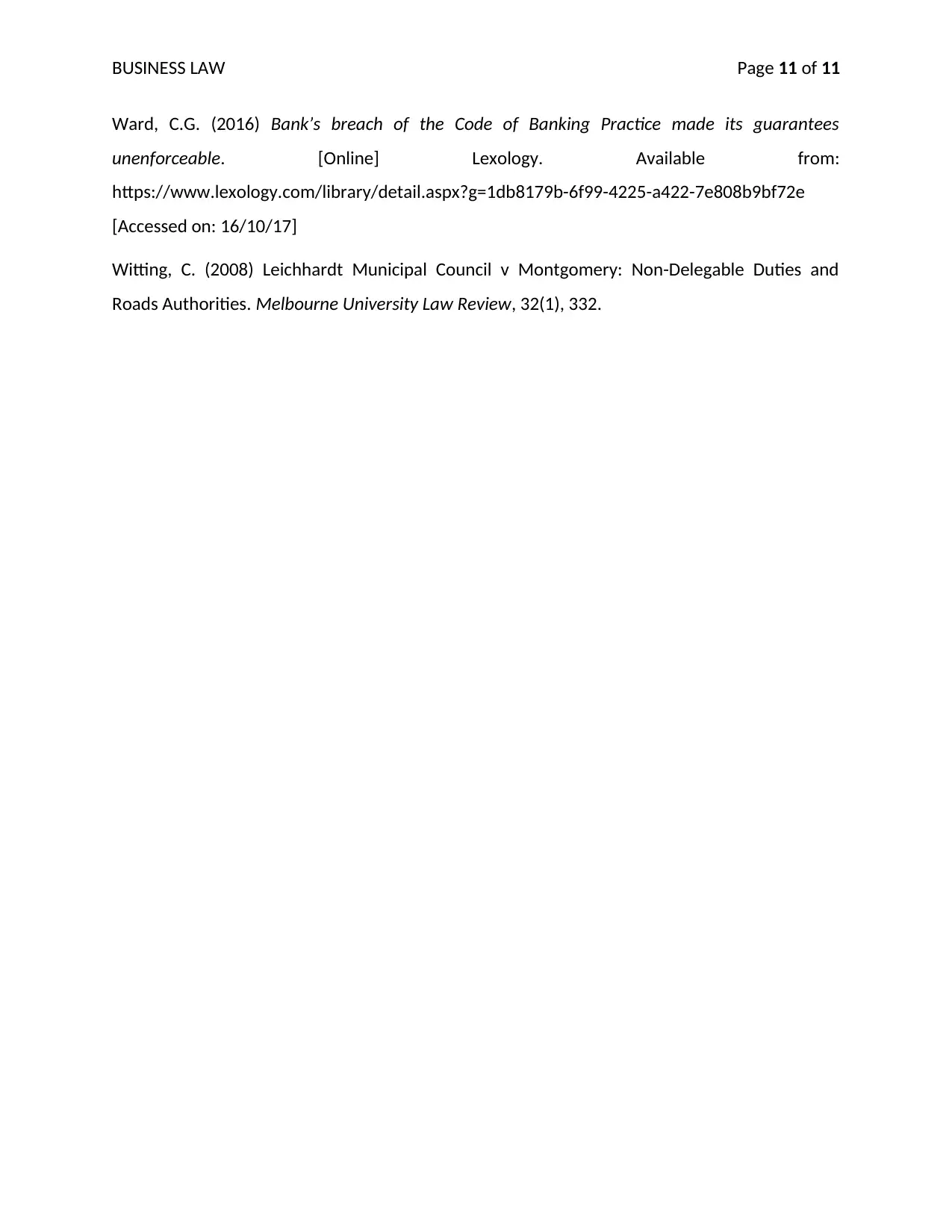
BUSINESS LAW Page 11 of 11
Ward, C.G. (2016) Bank’s breach of the Code of Banking Practice made its guarantees
unenforceable. [Online] Lexology. Available from:
https://www.lexology.com/library/detail.aspx?g=1db8179b-6f99-4225-a422-7e808b9bf72e
[Accessed on: 16/10/17]
Witting, C. (2008) Leichhardt Municipal Council v Montgomery: Non-Delegable Duties and
Roads Authorities. Melbourne University Law Review, 32(1), 332.
Ward, C.G. (2016) Bank’s breach of the Code of Banking Practice made its guarantees
unenforceable. [Online] Lexology. Available from:
https://www.lexology.com/library/detail.aspx?g=1db8179b-6f99-4225-a422-7e808b9bf72e
[Accessed on: 16/10/17]
Witting, C. (2008) Leichhardt Municipal Council v Montgomery: Non-Delegable Duties and
Roads Authorities. Melbourne University Law Review, 32(1), 332.
1 out of 11
Your All-in-One AI-Powered Toolkit for Academic Success.
+13062052269
info@desklib.com
Available 24*7 on WhatsApp / Email
![[object Object]](/_next/static/media/star-bottom.7253800d.svg)
Unlock your academic potential
Copyright © 2020–2026 A2Z Services. All Rights Reserved. Developed and managed by ZUCOL.
